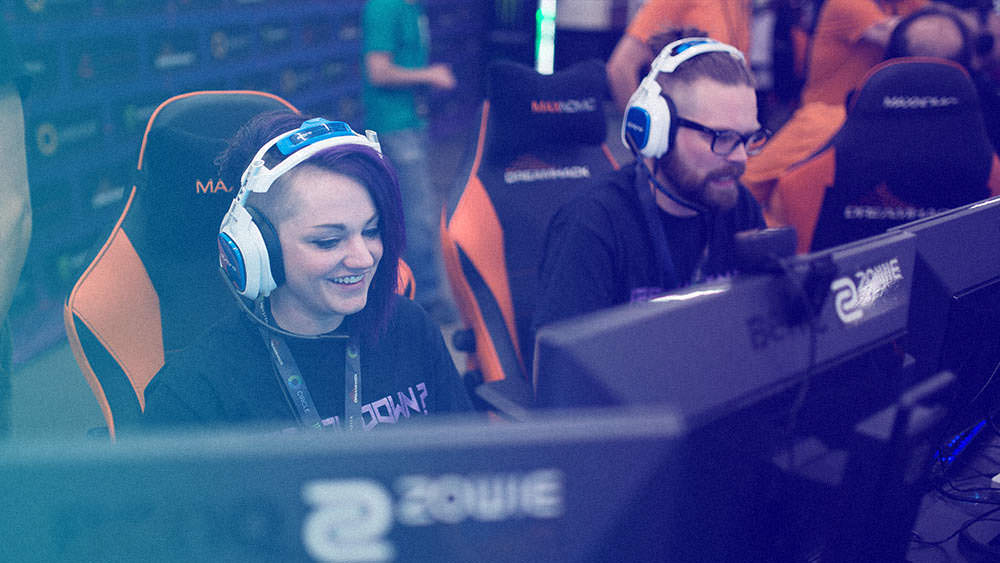Esports marketing isn’t just for energy drinks. As tens of thousands of gamers descended upon DreamHack Denver, several brands—endemic and non-endemic alike—took the opportunity to connect with a young and engaged fan base.
AListDaily caught up with some of the top brands at DreamHack Denver to talk about how they approach the gaming demographic and stand out in a saturated marketplace.
Circle Pay
Circle is a social money transfer app that recently began its journey into esports marketing. DreamHack Denver may have been Circle’s first major sponsorship for esports, but the team there includes video game industry veterans and esports enthusiasts.
Josh Hawkins, vice president of marketing for Circle, warns brands against marketing to gamers without first doing their homework.
“The esports and gaming community is multidimensional, very tightly knit and has a very low tolerance for bullshit,” said Hawkins. “Advice for marketers getting into the space? Do your time. Immerse yourself in the community, deliver real value and be real.”
Try @CirclePay the official payment app of DreamHack Denver
Enter promo code HACK. You could win $100/day. Esports, meet Emoney #DHDEN17 #Ad pic.twitter.com/u3Y4idpli3— DreamHack (@DreamHack) October 22, 2017
Leesa Sleep
When you think of gaming, you might not think of mattresses, or even about getting much sleep. But since DreamHack is a three-day, round-the-clock event, having a mattress company as a sponsor made sleeping on-site a welcome option. In addition to a booth at the DreamHack Denver expo, Leesa created a Sleep Zone where special ticket holders could reserve a bed for the weekend.
Lily Hecht-Leavitt, head of partnerships at Leesa Sleep told AListDaily that the brand’s price, digital presence and ease of set-up made a positive impression on the gaming community.
“We started out on the Giant Bomb podcast and that’s how we first learned that we resonated with the gaming community,” said Hecht-Leavitt. The company has partnered with sites like GeekDad and Hardware Canuks, as well as other gaming and tech enthusiasts across social media.
When you’re a brand that could potentially appeal to multiple demographics, using the same campaigns across the board just won’t do.
“Everything we use is catered to a specific audience,” said Hecht-Leavitt. “Use the language. We say things like ‘recharge’ or ‘respawn’ on a Leesa mattress. You want to make sure that the imagery you’re using is right. Even the font and the positioning [are important]. You also want to keep [brand messages] short and to the point—something catchy. If you can combine all that together, you can create something great. Also, have some kind of offer. Promo codes allow us to track web traffic to see the ROI.”
You still have time to grab yourself a @leesasleep mattress which is what we used in at DreamHack Denver!
🛏 https://t.co/0IW1BACXXl#Sponsor pic.twitter.com/5aVHO0Gfw8— DreamHack (@DreamHack) October 22, 2017
Sceptre
Sceptre has manufactured TVs and computer monitors for over 30 years and drove right into esports marketing as the brand sponsors Azio Esports, who came in second for League of Legends in DreamHack Denver’s BYOC (Bring Your Own Computer) tournament.
Alan Liu, web and gaming director for Sceptre, told AListDaily that DreamHack Denver was Sceptre’s fifth gaming event so far.
“Esports is ramping up like crazy,” said Liu. “We wanted to see how we could apply our affordability and quality to the typical gamer. We recently came up with a few lines of curved monitors and we fashioned them with lights, nice panels, etc. and we’re slashing the prices to appeal to the college gamer who can’t afford those top-of-the-line monitors.”
Sceptre offered $200 off a 32-inch curved monitor, bringing the price down to $199.99 during the show, and 4K UHD TVs for as low as $289. While low prices are often a strong selling point, Liu explained that gamers care about the quality more.
“It’s all about the specs,” he said. “With esports, everyone’s watching the pros and the top streamers. It’s kind of like traditional sports—when they see a pro player or streamer and their gear, they’re going to want to be just like them. By appealing to that mentality, you’ll be able to attract many more gamers—from casual to pros.”
The AZIO Esports LoL team is about to sweep the #DHDEN17 BYOC tournament. @SceptreDisplay @akitio @SeenMerch @OfficialEGL pic.twitter.com/SMm4TOmVaf
— AZIO Esports (@AzioEsports) October 21, 2017
HyperX
Gaming peripheral brand HyperX positioned its large booth next to the DreamHack entrance for all to see as they arrived. Attendees were able to test out the latest products, including keyboards, headphones and the newly released computer glasses.
Annie Gerard, global strategic marketing manager for HyperX told AListDaily that it’s not enough to be an endemic brand when speaking to gamers.
“In terms of our marketing, we really try to be authentic,” said Gerard. “The gaming community sees through your marketing PR spiel, so if you’re not really part of their lifestyle speaking their lingo, they’re going to walk away. One of the ways that we do that is by passionately supporting the communities out there from teams to streamers and cosplayers—we really try to connect with them to offer exclusive content or bring them to the shows, allow them to meet fans and celebrities.”
Esports marketing from the brand includes the sponsorship of a number of teams, including Cloud9 and Team Liquid, both of which were competing—and won—in Denver. Despite their esports fame, HyperX advises brands against catering to just one segment of gaming, citing their slogan, “We’re All Gamers.”

